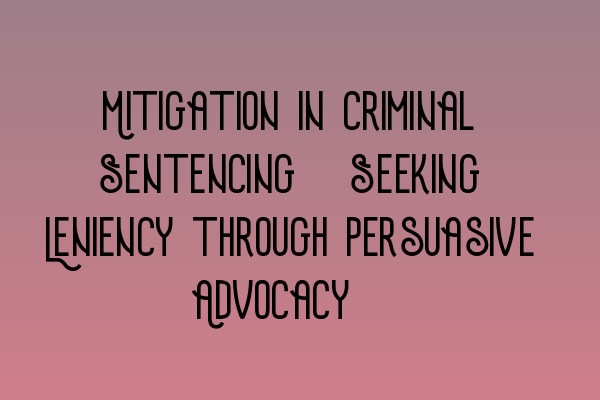Mitigation in Criminal Sentencing: Seeking Leniency through Persuasive Advocacy
When facing criminal charges, it is essential to understand the importance of mitigation in the sentencing process. Mitigation refers to the factors and arguments that can be presented to a court to seek leniency and a reduced sentence for the accused. Effective mitigation requires a persuasive and strategic approach, with skilled advocacy playing a crucial role in influencing the court’s decision.
The Purpose of Mitigation
Mitigation primarily serves the purpose of providing contextual information to the court about the accused and the circumstances surrounding the offense. It allows the defense to present evidence and arguments that may justify a lesser sentence or alternative punishment.
The court considers various factors during the sentencing process, such as the seriousness of the offense, the impact on the victim and society, the defendant’s criminal history, and their personal circumstances. Effective mitigation can address these factors, presenting a more complete picture of the accused and their situation.
Persuasive Advocacy in Mitigation
Persuasive advocacy is crucial in presenting mitigation effectively. It involves constructing a compelling narrative that highlights the defendant’s positive attributes, personal development, and remorse for their actions.
One effective strategy is to emphasize the defendant’s genuine remorse and efforts towards rehabilitation. This can involve presenting evidence of counseling, therapy, or participation in community service programs. By demonstrating the defendant’s commitment to change, it becomes easier to argue for a reduced sentence.
Another key aspect of persuasive advocacy is highlighting any mitigating circumstances surrounding the offense. This can include factors such as provocation, coercion, or duress. By presenting these mitigating factors, the defense can argue that the accused’s actions were not entirely their fault, reducing their level of culpability.
Expert Legal Representation
To effectively present mitigation, it is essential to have expert legal representation. Qualified solicitors with expertise in criminal law and practice can provide valuable guidance and develop a compelling mitigation strategy.
At SQE Criminal Law & Practice Law UK, our solicitors are well-versed in the art of persuasive advocacy in mitigation. Through our extensive experience and knowledge, we have successfully obtained lenient sentences for our clients in various criminal cases.
If you or your loved one is facing criminal charges, it is crucial to seek professional legal assistance immediately. Our solicitors will analyze your case, identify relevant mitigating factors, and develop a persuasive mitigation strategy tailored to your specific circumstances.
Conclusion
Mitigation plays a significant role in criminal sentencing, offering an opportunity to seek leniency and a reduced sentence. By employing persuasive advocacy and presenting compelling arguments, it is possible to influence the court’s decision.
If you require expert legal representation for your criminal case, contact SQE Criminal Law & Practice Law UK today. Our solicitors are ready to guide you through the complexities of the criminal justice system and fight for the best possible outcome.
Related Articles:
- SQE 1 Practice Exam Questions
- SQE 1 Practice Mocks FLK1 FLK2
- SQE 2 Preparation Courses
- SQE 1 Preparation Courses
- SRA SQE Exam Dates
